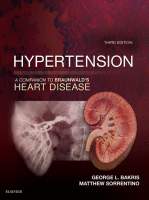Physical Address
304 North Cardinal St.
Dorchester Center, MA 02124

Worldwide, hypertension remains a powerful, independent marker of cardiovascular mortality and death from all causes. In 2013, high systolic blood pressure (BP) accounted for more than 10 million deaths globally. In the United States, hypertension caused nearly 397,000 deaths in…

Older patients represent the most rapidly increasing segment of the United States population and account for the largest health care expenditures. Age is a major risk factor for the development of hypertension, and in particular, systolic hypertension. From 1999 to…

Hypertensive disorders are the most common medical conditions during pregnancy and are a leading cause of maternal and perinatal morbidity and mortality worldwide. Hypertension complicates 6% to 10% of pregnancies and, of 4 million women giving birth in the United…

Epidemiology of Hyperlipidemia Prevalence Elevated cholesterol is a well-established and modifiable risk factor for cardiovascular disease (CVD). In 2008 there were an estimated 17.3 million CVD deaths worldwide, 2.6 million (15%) of which were caused by hyperlipidemia. Data from the…

Diabetes mellitus (“diabetes”) and hypertension, which commonly coexist, are global public health issues contributing to an enormous burden of cardiovascular disease, chronic kidney disease, and premature mortality and disability. The presence of both conditions has an amplifying effect on risk…

Raised blood pressure has been referred to as the crown jewel of stroke prevention, and blood pressure lowering has been the focus of substantial study in acute stroke and recurrent stroke prevention as a means to improve outcomes. In this…

Association of Obesity And Hypertension Obesity has been called the epidemic of our time with approximately 70% of the adults in the United States either overweight or obese according to the American Heart Association (AHA) and the American Physiological Society.…

Hypertension is a common feature after solid organ transplantation, related to preexisting disease, the vascular effects of immunosuppressive medications, and in the setting of renal transplantation, the presence of acute or chronic allograft morbidity. Transplant patients frequently carry a heavy…

Chronic kidney disease (CKD) is defined by laboratory findings of a decreased estimated glomerular filtration rate (eGFR) to less than 60 mL per minute per 1.73 m 2 or evidence of renal parenchymal injury (i.e., albuminuria > 300 mg/day) present…

The burden of heart failure remains ever present with a long-standing, inexorable association with hypertension. Though advances in evidence-based medical therapy for reduced ejection fraction heart failure have led to impressive reductions in morbidity and mortality, the residual burden of…